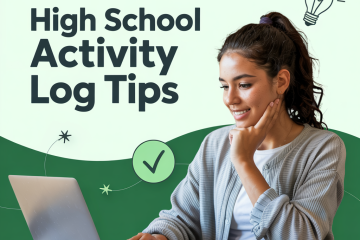Peer Tutoring & Mentoring as Leadership & Impact Extracurriculars

Many students help their classmates succeed through peer tutoring or mentoring programs. While you might see it simply as helping out, these roles are actually powerful extracurricular activities. Including peer tutoring resume experience or describing mentoring college application entries effectively showcases valuable leadership skills and demonstrates a positive impact on your school community. Let’s look at how to highlight these important contributions.
Helping Others = A Powerful Extracurricular
Activities where you directly support the learning or well-being of your peers are highly regarded by colleges. They go beyond personal achievement and show your ability and willingness to contribute to others’ success. Tutoring and mentoring are excellent examples of academic support extracurricular activities with tangible impact.
👉 Want to boost your college applications with powerful extracurriculars? Check out Cirkled In to showcase your achievements the smart way.
Why Tutoring and Mentoring Stand Out
These roles demonstrate qualities colleges love:
- Leadership: Guiding and supporting others, even informally, is a form of leadership. Developing leadership skills tutoring requires is significant.
- Subject Mastery: To teach a subject, you need to understand it well yourself.
- Communication Skills: Explaining complex concepts clearly, listening patiently, providing constructive feedback.
- Empathy and Patience: Understanding struggles and supporting peers through challenges.
- Responsibility: Committing time to help others succeed.
- Community Impact: Directly contributing to the academic or social well-being of your school community (helping peers impact).
Skills Developed Through Peer Support Roles
Think about all the skills you practice:
- Explaining concepts in different ways.
- Breaking down complex problems.
- Active listening to understand confusion.
- Providing encouragement and building confidence.
- Adapting your approach based on the learner’s needs.
- Time management (scheduling sessions).
- Sometimes, tracking progress or reporting back to a program coordinator.
Showcasing Impact: Beyond Just “Helping”
When describing your role, try to show the impact:
- Quantify: “Tutored 5 students weekly in Algebra I,” “Mentored 3 incoming freshmen throughout the year.”
- Mention Subjects/Focus: “Provided academic support in Chemistry and Physics,” “Focused on helping mentees adjust to high school.”
- Note Results (If Known & Appropriate): While direct grade impact can be hard to claim, you might mention general positive outcomes if observed or reported by a program supervisor (e.g., “Contributed to improved student confidence,” “Supported program goal of X”). Be cautious not to overstate results.
- Highlight Training: If you received specific training for the role, mention it.
How to Describe Tutoring/Mentoring on Applications
List these in your Activities Section:
- Position/Leadership: “Peer Tutor,” “Academic Mentor,” “Freshman Mentor,” “Writing Center Tutor.”
- Organization Name: Name of the specific program, club, or center (e.g., “NHS Tutoring Program,” “School Writing Center,” “Link Crew”). If informal, could be “Independent Peer Tutor.”
- Description: Use action verbs and quantifiable data.
- Example Tutoring: Peer Tutor, Math Honor Society. Tutored 5 students weekly in Algebra & Geometry. Explained concepts clearly & helped peers improve problem-solving skills. (Approx 140 chars)
- Example Mentoring: Link Crew Mentor. Guided 3 freshmen through high school transition. Led orientation activities & provided ongoing academic/social support via monthly check-ins. (Approx 148 chars)
- Focus on creating a strong tutoring experience description.
🎯 Already mentoring or tutoring? Create your free Cirkled In profile to make your efforts stand out to colleges and programs.
Getting Recommendation Letters
Consider asking the advisor who oversees the tutoring/mentoring program for a letter of recommendation. They can speak directly to your reliability, communication skills, patience, and impact on other students.
Final Thought: Highlight Your Role as a Helper
Don’t underestimate the value of peer tutoring or mentoring. These activities clearly demonstrate leadership, communication, empathy, and a commitment to your community. By including peer tutoring resume details or crafting strong mentoring college application descriptions that highlight your skills and impact, you showcase qualities that colleges genuinely appreciate. Your efforts in helping others succeed matter.
Need more tips on college applications, scholarships, or just how to survive this whole process? Cirkled In has your back—check out Cirkled In resources to help you through every step of your college journey!



2 Comments
Rison · December 18, 2025 at 9:00 am
I’ve found this positively helpful and it has helped me out loads.
Amy S · December 29, 2025 at 3:11 pm
So glad it’s been helpful, Rison! 🙌 Peer tutoring really does double as a leadership boost and a way to make an impact. Keep rocking it!